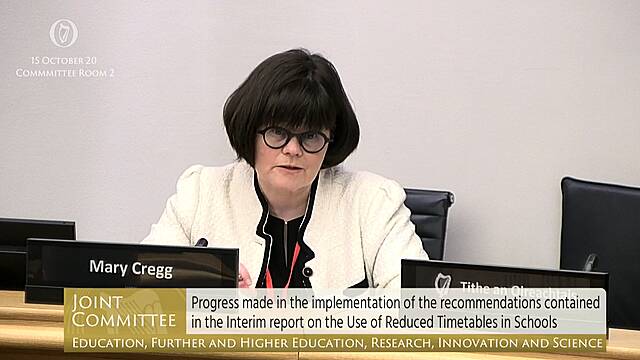Department of Education officials will issue new guidelines on the issue to schools early next year, but they said timetables should only be reduced in limited circumstances.
The use of reduced hours for pupils is intended as a way to support those rejoining a class after an illness-related absence.
But an interim report into their use in special education schools found they were sometimes employed as a “behavioural tool”.
A reduced timetable when used as a sanction can be considered a suspension. So the appeal process is there for parents.
Mary Cregg, principal officer at the social inclusion unit in the Department of Education, told a Dáil committee the practice is to be “limited solely to those circumstances where it is absolutely necessary”.
She said: “In some limited circumstances, as part of a reintegration technique, a reduced timetable can have a positive impact with a view to getting a child for a longer day. But on a limited time frame.
“So we would have been informed by that approach, and that’s why we took the approach we did with the guidelines. So we are leaving the possibility of a reduced timetable there with the consent of the parent.”
Concerns were raised by several TDs and Senators at Thursday’s education committee meeting about the misuse of reduced timetables as punishment or behavioural control for students.
Sinn Féin TD and education spokesman Donnchadh O’Laoghaire said: “Reduced timetables can have a role, where correctly applied.
“But there seems to be incidences where it was misapplied, where it was abused, and where children were ultimately being denied an education.
“If a school was non co-operative, if they carried on with whatever bad practices were there, what sanctions would exist for that school?”
Ms Cregg replied: “If a parent or a guardian has an issue with a reduced timetable, the guidelines allow for their parental consent to be withdrawn.
“A reduced timetable when used as a sanction can be considered a suspension. So the appeal process is there for parents.”

Independent Senator Lynn Ruane raised concerns that parental consent is “not actually clear cut”, and parents sometimes feel “coerced” into accepting reduced timetables for their children.
She said there had been an unfair use of reduced timetables for children from disadvantaged backgrounds, and traveller children in particular.
She said: “In some senses it was very much viewed as our modern day segregation and discrimination in terms of how reduced timetables were being used in particular communities and particular schools.
“Guidelines are an important step forward. But what in addition to guidelines can be introduced so there’s not a cultural use of reduced timetables in schools with families that are not in the same position to advocate in the way that some parents are?”
Senator Fiona O’Loughlin, who worked on the issue as Education committee chair in the previous Dail, said it is vital a child’s right to education is honoured.
She said once children are “marginalised” in this manner, it has “significant impacts on their life choices”.
At present there is no data available on the prevalence of reduced timetables in schools. That data is currently being collected to “inform policy”, Ms Cregg said.







